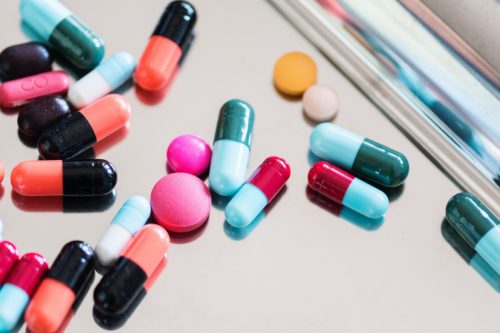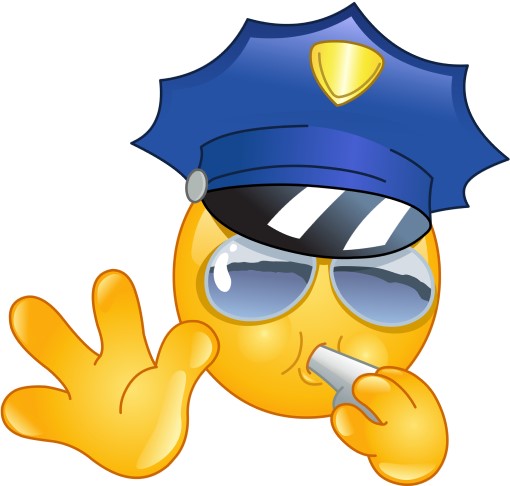
Sleep tips and insomnia remedies for police officers: A no nonsense sleep guide for law enforcement
By Jason Wooden, PhD and Kristal McKinney, LICSW, CMHS | July 11, 2021
It’s no surprise so many cops and other members of law enforcement struggle with poor sleep given the demands of the job. Poor sleep can affect your performance, make the job more stressful, and pose a safety risk.
Your options to get your sleep back on track include sleep hygiene, improving your sleep environment, stress management, sleep counseling, and sleep teletherapy.
You should also see a doctor to check for sleep disorders and other underlying health issues that make it harder to sleep.
CONTENTS:
1) No wonder you’re sleeping so poorly
2) 4 things that could be holding your sleep back
3) How much sleep does a police officer need?
4) Sleep hygiene tips
5) Bedroom sleep tips
6) Stress management tips
7) Night shift tips
8) 13 insomnia remedies for police officers
9) Don’t forget to do this!
No wonder you’re sleeping so poorly
Did you know every night one in three adults struggle with sleep?
Unfortunately for police officers and other members of law enforcement, the sleep crisis is worse given the demands of the job.
According to a Ball State University study, law enforcement is one of the most sleep deprived professions with around 50 percent of workers getting less than seven hours a night.
In another study, two thirds of the respondents said they only get three to six hours of sleep in a typical 24-hour period while working day shifts
And it doesn’t help that 40 percent of police officers also suffer from a sleep disorder.
Unsurprisingly, stress is a major factor behind these numbers…
Just how much stress?
Tons of stress from unpredictable and life threatening situations, long work hours, organizational pressures, shift work, financial stress, and marital tension.
That’s a long list and a lot for anyone.
It’s no wonder you and many others are getting the short end on sleep.
Whether this is you or someone you know, there’s too much at stake given the cost of poor sleep.
Sleep is as essential as breathing, drinking, and eating…
It’s how the body replenishes and heals itself.
We’re not wired to operate without it.
Sleep deprived people don’t think as clearly, have a harder time coping, and don’t perform as well at school or on the job. They’re also irritable and moody.
Chronic sleep loss puts you at risk for all sorts of issues – diabetes, high blood pressure, cardiovascular disease, obesity, a weakened immune system, anxiety, and depression.
Intimacy can suffer due to suppressed sex hormones, erectile dysfunction, and low energy.
The job is tough enough on it’s own. Add poor sleep to the mix, it’s not just simply that you’re dragging, less alert, and not thinking as clearly.
You can put your safety and the safety of others at risk.
Risks for police officers and law enforcement:
- falling asleep during meetings
- falling asleep while driving and on duty
- errors or safety violations
- work-related accidents
- compromised decision making
- uncontrolled anger toward suspects
- more difficulty dealing with community members and other law enforcement agencies
It should be clear you really need your sleep.
The good news it there’s plenty you can do to improve your sleep and make the job more manageable.
Let’s take a look at what you and your coworkers are up against, some practical sleep tips and insomnia remedies for police officers, and what else you need to think about.
Four big sleep challenges for police officers and law enforcement
There are plenty of things that can make it harder to sleep. Some are obvious and some not so obvious.
People who sleep poorly are often dealing with more than one issue.
What are your current sleep challenges?
Let’s take a look at what you could be up against:
Stress and anxiety:
Stress and anxiety are among the most common causes for poor sleep. Unfortunately for law enforcement, the stress levels can get off the chart.
Occasional stress and anxiousness is a normal thing. It’s when it keeps happening you can really get in trouble.
We all know from personal experience how hard it is to fall asleep with a racing mind.
As a response to stress and anxiety, your body may turn on the fight-or-flight response and pump out stress hormones designed to get you in a heightened state of arousal. (It’s a primal response to danger that unfortunately becomes a chronic condition affecting sleep and behavior.)
That’s why stress and anxiety are so bad at night – they make it harder to fall asleep AND harder to stay asleep throughout the night.
Stress can also aggravate other sleep issues such as chronic pain, body tension, and mood.
And the more you stress out about falling asleep, you can get a sleep anxiety that feeds back on everything else.
Depression:
It’s not uncommon for people working in very stressful jobs to get worn down, experience burnout, and start feeling down.
People who work in law enforcement may deal with PTSD, anxiety, and depression.
Did you know there’s a strong link between poor sleep and depression? Many people struggling with depression also struggle with sleep.
According to studies, people with insomnia are more likely to develop major depression associated with sleep problems.
If you’re not careful, you can get in a vicious cycle where feeling down leads to more poor sleep and poor sleep leads to more anxiety and depression.
In some case, depressed people may even sleep too much which is its own problem.
Undiagnosed sleep disorders:
You may be living with an undiagnosed sleep disorder. There are many different types, some more common than others.
In a study in 2011, researchers at Brigham and Women’s Hospital found that 40 percent of police officers screened positive for sleep disorders. (That’s double the estimated amount for the general population!)
Obstructive sleep apnea has been found to affect one in three police officers.
It happens when the muscles in the throat relax too much during sleep causing your airway to collapse and restrict the flow of oxygen.
It’s a real sleep killer that keeps you out of deep restorative sleep so you wake up in the morning feeling as if you haven’t slept at all.
Shift work disorder is common among people working in law enforcement, affecting 14 percent of police officers who work night shift.
Working nontraditional hours such as on an evening, night, or rotating shift is a common cause for fatigue on the job. It’s just hard to keep your natural sleep clock on schedule when your sleeping at odd hours and out of sync with the sun.
People with shift work disorder have trouble falling asleep and struggle with excessive sleepiness when awake.
Health issues:
Did you know there could be something going on with your body that’s making it harder to sleep? There’s a long list of health challenges that can cause or worsen sleep issues.
It’s obvious what ongoing pain and body aches does to sleep. Allergies, asthma, heart burn, heart disease, and diabetes are also on the list of trouble makers.
And unfortunately, sometimes the meds for health issues can cause problems for sleep too.
How much sleep does a police officer need?
Okay, you’re probably wondering how much sleep do I really need?
The thing to keep in mind about sleep is that how WELL you sleep is just as important as how LONG you sleep.
To wake up feeling rested and ready for the new day, it’s important to get deep restful sleep.
That means you need to get enough cycles through the four sleep stages:
N1 stage: between awake and falling asleep
N2 stage: onset of sleep
N3 stage: deep restorative sleep
REM stage: rapid-eye-movement and dreams
Those later stages are really important because it’s when your body restores and replenishes itself.
A full sleep cycle through all four stages is roughly 90 minutes long. Sleep experts say that adults need at least four to five cycles to feel rested.
That works out to about 6 to 9 total hours of sleep for an adult.
In reality sleep cycles are not uniformly 90 minutes throughout the night and can vary from night to night. Your sleep cycle can even change as you get older and everyone doesn’t have exactly the same sleep cycles.
That’s why 6 to 9 hours is a ball park estimate. Some people can get away with less and some need more.
Since your job is extra stressful, you may need even more sleep than the average Joe.
You’ll need to find the sweet spot for you.
Sleep hygiene tips for police officers and law enforcement
What you do during the day, evening, and at night can make a big difference for your sleep.
Sleep hygiene involves the everyday habits that can make or break sleep. It sets the stage for deep restful sleep.
Practicing good sleep hygiene will help you make the best of your sleep opportunities. Poor sleep hygiene can sabotage other things you do to improve your sleep.
It’s important for everyone, but it’s really important for people working in law enforcement given the many challenges of the job. There’s already a lot working against you to derail your sleep, so why make it any harder?
For better sleep you should:
- keep consistent wake up & sleep times
- avoid naps
- exercise and movement during the day
- avoid large meals, alcohol, or stimulants such as caffeine before bedtime
- maintain a regular bedtime routine
- include stress management strategies in your daily routine
- avoid using TVs, laptops, or other electronics before sleep
- keep your bedroom dark, cool, quiet, & relaxing
Bedroom sleep tips for police officers and law enforcement
Is your bedroom comfortable and set up to maximize your sleep opportunities?
Having a great sleep environment is one of the most important sleep hygiene rules. Your bedroom can have a big impact on how easily you transition to sleep and how well you sleep.
It’s even more important for people in law enforcement to get the best possible sleep whether they are working day, night, or rotating shifts.
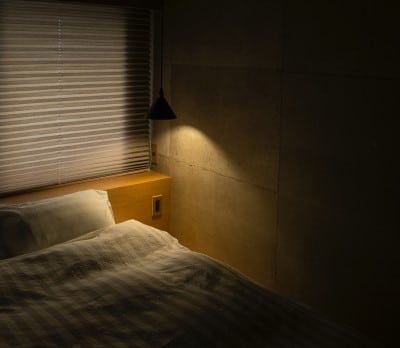
For optimal sleep, experts recommend that you keep your sleeping space DARK, QUIET, and COOL:
Keeping it dark
Bright light can interfere with your body’s natural sleep-wake cycle and keep you from feeling sleepy. Even small amounts of ambient light can affect melatonin production and keep you from getting quality sleep.
Keeping it quiet
Nuisance noises can keep you from falling asleep and keep you out of restful deep sleep even when you’re not awake. Experts recommend you turn off your TV or radio.
Try using ear plugs or white noise if there are surrounding sounds you can’t get rid of.
Keeping it cool
Cooler room temperatures help your body’s natural sleep process. A temperature between 60 and 67 degrees Fahrenheit is optimal for sleeping with 65 degrees being the sweet spot. Obviously, everyone’s body is a little bit different.
You don’t want to lay in bed shivering because your bedroom is too cold. You also don’t want to toss and turn because you’re too hot.
Stress management tips for police officers and law enforcement
What’s your current level of stress?
Since it’s one of the biggest enemies of sleep and officers face some of the highest levels of work-related stress, it’s important to do whatever you can to manage it.
For starters, you should avoid unhealthy ways of coping with stress that can come back to bite your sleep such as:
- smoking
- drinking too much
- overeating or under eating
- zoning out for hours in front of the TV or computer
- withdrawing from friends, family, and activities
- using pills or drugs to relax
Other things that can help with stress include:
Avoiding unnecessary stress – set boundaries around people and commitments
Regular sleep – unsurprisingly, people who sleep poorly are more stressed once awake
Exercise – it’s a natural mood booster and great way to fight the effects of stress
Healthy eating – good nutrition equips the body to better handle stress and its effects
Setting aside time for fun activities
Scheduling vacations and personal downtime
Post-work relaxation routine
Mindset – how you think about things and react to them can have a big impact
Manage your expectations – be realistic about what you can do on your time off
Support network – having supportive people in your life can really help with stress; it can include more formal support such as psychotherapy
Living within your means – can help keep the financial stress down
Managing marital stress – take positive necessary steps to deal with any issues and re-energize the relationship
Night shift tips for police officers and law enforcement
Are you doing the right things to get the best possible sleep when working on night shift?
Okay, here’s the challenge – our bodies are wired to be awake when the sun is up and sleep when it’s dark.
Working at night causes you to go against the natural sleep-wake cycle of the body.
You’re forcing yourself to be awake when your body is receiving signals it should be asleep. Likewise, when you get home, daytime light tells your body it’s supposed to be awake.
Some of things that can help keep your sleep on track if you work night shift are:
Cluster your shifts – will help your body get used to one schedule
Have a regular routine – this will help you unwind and prepare for sleep
Have a snack – hunger pangs can keep you up
Block out time for sleep
Get everyone else on board – make sure family and friends know to leave you alone
Check your sleep environment – do what you can to keep it dark, quiet, and cool!
Go to bed right away – the more you delay, the greater the chances you have trouble falling asleep
Avoid anything that can keep you up – stimulants such as caffeine or nicotine, activities that will get you wired up will make it harder to get to sleep on time; some medications can also affect sleep
Watch how you nap
Maintain your sleep wake schedule on off days (if you can)
Insomnia remedies for police officers and law enforcement
You’re probably wondering if there’s anything else you can do if you’re struggling to fall asleep. Depending on your situation, there are plenty of remedies worth a try:
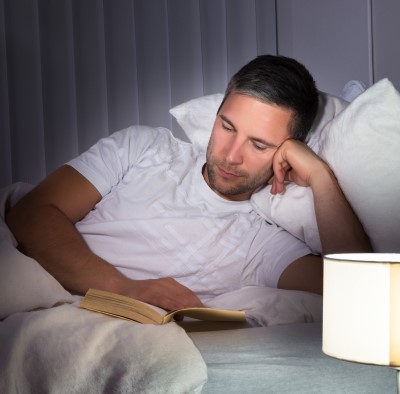
1) Light reading
Reading can take your mind off things, be sure to avoid those page turners that keep you up too late.
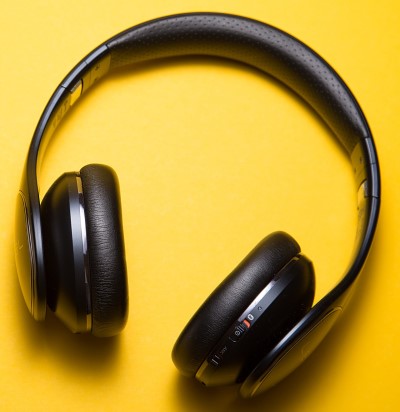
2) Relaxing music
Calming music has been shown in studies to reduce anxiety and help people relax. In sleep studies, subjects fall asleep faster and experience better sleep quality.
What you want is music that will sooth you to sleep, not something that will get your heart racing. Slow rhythm songs (60 to 80 beats per minute) is what’s been shown in studies to improve sleep.
Popular choices include classical and new age music. You may have to experiment a little to figure out what works best for you.

3) Sleep music tracks
Similar to calming music, sleep tracks are designed to help people fall asleep more quickly. Often, they combine quiet music with nature sounds.
You can purchase them online or stream them for free on YouTube and phone apps.
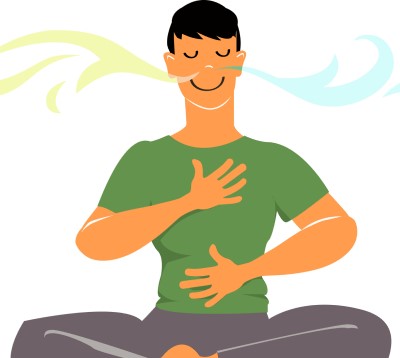
4) Deep breathing
Deep breathing is a simple way to calm the body. One popular technique is 4-7-8 breathing pioneered by Dr Andrew Weil.
It involves holding your breathing to various counts of 4, 7 and 8.
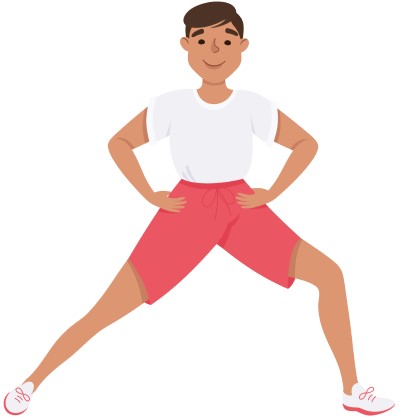
5) Gentle stretching
Light stretching can help the body relax. It may also help with the aches and pain that keep people from sleeping deeply.
Learn more: 8 Stretches for Your Best Night’s Sleep (SleepAdvisor.org)
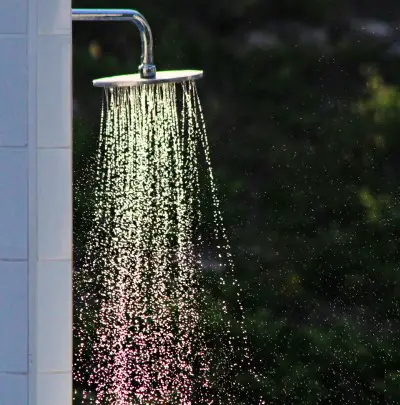
6) A warm shower
Did you know your body temperature naturally dips at night before bedtime? It’s one of the things that can signal your body it’s time for sleep.
A warm shower or bath can help you relax while raising your body temperature. When finished you return to a cooler bedroom and get a temperature saying it’s time to sleep.
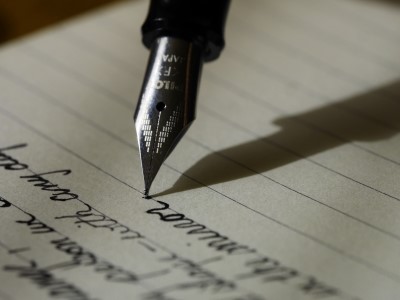
7) Write it down
Sometimes when there’s a lot on your mind, it helps to put things down on paper.

8) Progressive muscle relaxation
Progressive muscle relaxation is a technique where you tense and then relax one muscle group at a time. It has been found to help with stress and insomnia.
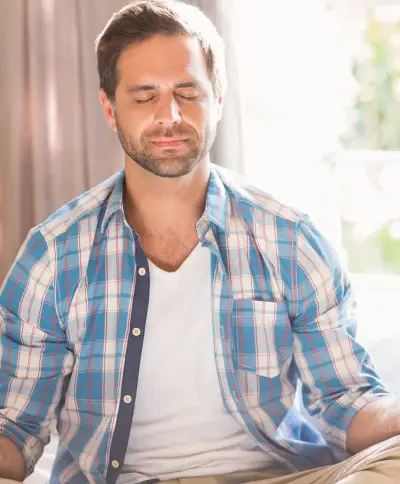
9) Meditation
Mindfulness meditation is a mind-calming technique that involves focusing on your breathing and keeping your awareness on the present moment.
This simple technique has been shown in studies to promote sleep.

11) Natural sleeping aids
There are all sorts of natural supplements that can help the body transition to sleep. Some have been scientifically tested while others have not.
Among the more popular are chamomile, hops, and valerian root.
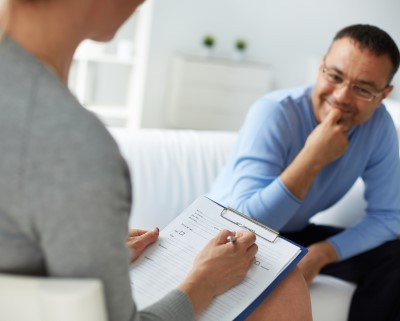
12) Sleep counseling
Did you know that counseling is one of the most effective treatments for insomnia?
There’s a strong connection between the mind and body. Your mind, brain, behaviors, and body can interact in powerful ways that affect health and wellness.
Too often, people develop bad attitudes, habits, and associations that make it harder to sleep.
A specialized type of sleep counseling, cognitive behavioral therapy (CBT-i for short), can help identify and change thoughts and behaviors that affect sleep. It’s one of the most effective insomnia treatments.
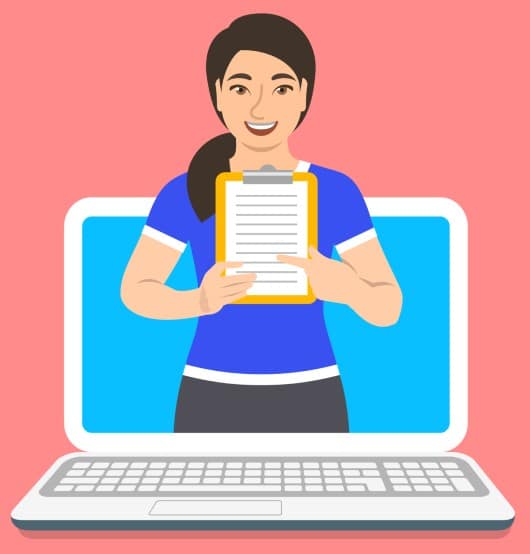
13) Sleep teletherapy
With modern computer technology, you can now get sleep counseling from the comfort of your own home thanks to Sleep Easy.
It’s a first of a kind online counseling program developed by Dr. Richard Shane based on his clinical work helping thousands of people suffering from chronic insomnia.
We’ve partnered with Sleep Easy to help get the word out and we’re urging all of our readers take a look at them.
Another reason we’re including them on the list is because Dr. Shane’s approach has been used for decades to help police officers and other first responders.
Sleep Easy’s teletherapy is confidential.
Don’t forget to get a check up
When is the last time you’ve had a physical?
If you haven’t had a recent checkup, it’s really worth getting one. We’ve already mentioned all the things that could be going on with your body making linked to poor sleep.
If you don’t deal with these underlying issues, you may be just sticking a band aid on things. That makes it important to see a doctor, especially if your insomnia has become a long-term problem.
Your doctor can check for health issues and sleep disorders you may not be aware of. They can also make sure any medications you’re taking are not making it harder for you to get sleep.
You may also be interested in:
Insomnia diagnosis and treatment
Sleep-friendly ways to relax at night
How to get to sleep after one too many energy drinks
9 Things worth a try if you drank too much coffee
What to do if too much light is keeping you awake
12 Things to try if a noisy neighbor is keeping you from sleeping
Sleep tips for firefighters and EMTs
Sleep tips for nurses and care providers
Sleep help and counseling for couples: Hope for better nights
Sources:
1. “1 in 3 adults don’t get enough sleep”, CDC website
2. Short Sleep Duration in Working American Adults, 2010–2018, Journal of Community Health volume 45, pages 219–227 (2020)
3. Sleep Disorders, Health, and Safety in Police Officers, JAMA. 2011;306(23):2567-2578.
4. “The Aching Blue: Trauma, Stress and Invisible Wounds of Those in Law Enforcement”, 2020, Anxiety and Depression of Association of America website
5. “Depression and Sleep”, 2021, sleepfoundation.org
6. “Insomnia: The Mind, Body, and Emotion Connection”, American Sleep Association website
7. “What Happens When You Sleep?”, 2020, sleepfoundation.org
8. “Enhance Your Sleep Cycles”, 2016, alaskasleep.com
9. “The ‘Sleep Calculator’ is just unscientific hype”, 2018, Sleep Health Foundation website
10. “Stress Management: How to Reduce, Prevent, and Cope with Stress”, BrainLine.org
11. “Life hacks: How to cope with night shifts”, 2017, MedicalNewsToday
Connect with us:
About Us
Better Sleep Simplified® was founded as a place for you to get clear and well-researched information.
Our goal is to make sure you know about your options so that you take action sooner rather than later.
Check us out on YouTube:
Watch and Learn
Helpful sleep tips, interesting sleep facts and statistics you want to know about
Affiliate Disclosure
This site is a participant in the Amazon Services LLC Associates Program and other affiliate advertising programs designed to provide a means for sites to earn advertising fees by advertising and linking to them.
Important: BetterSleepSimplified.com is for informational purposes only and is not intended or implied to be a substitute for professional medical advice, diagnosis, or treatment. Always consult a physician for sleep and health concerns. See additional information.

